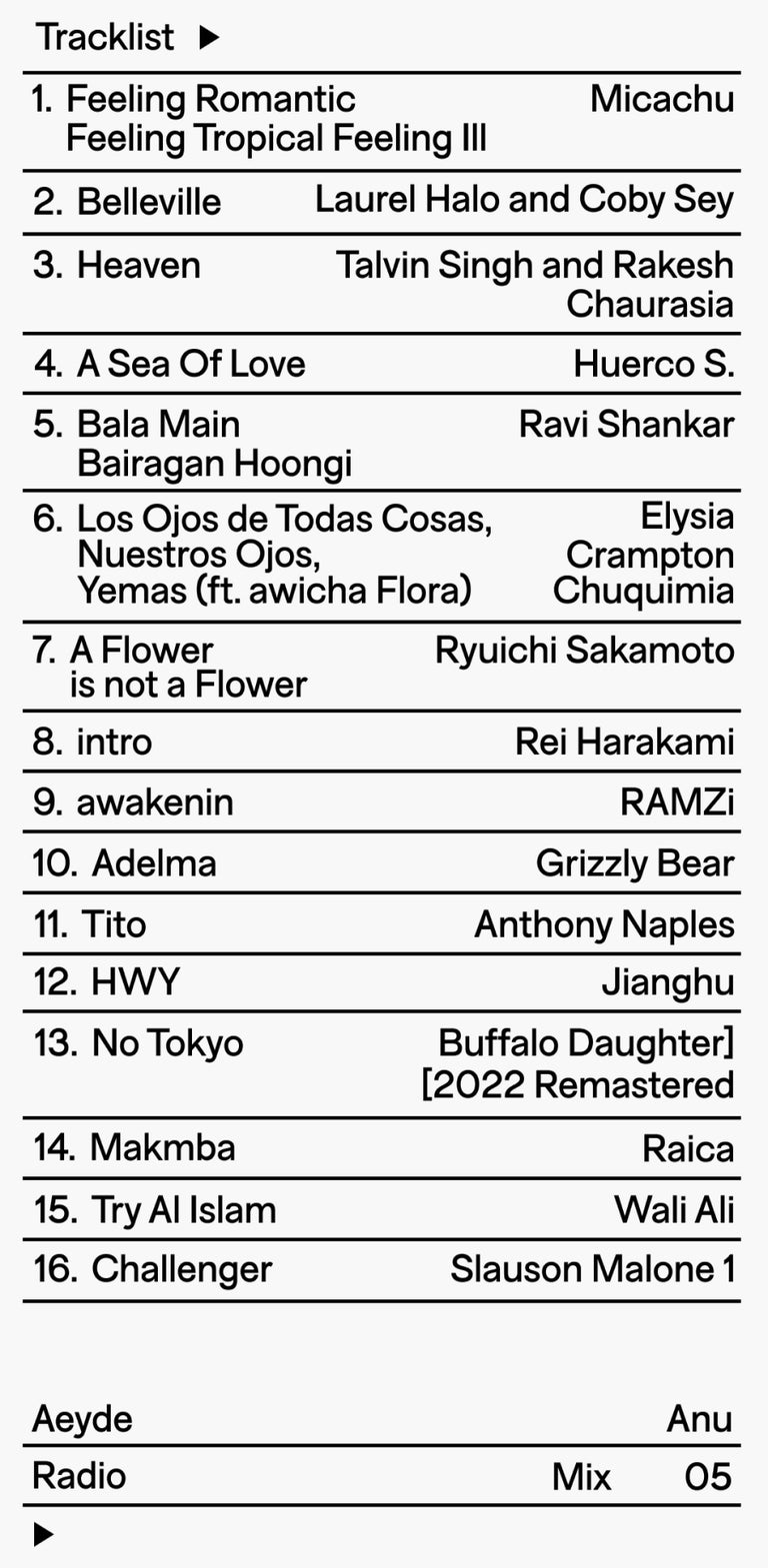Out Now | Spring/Summer '25 Shop Now


Whitney Wei: What’s your musical background?
Anu: I played the guitar from age seven or eight until I was 18. My dad is also a big music fan, so he would play jazz, Indian classical music, and punk. Then I have memories of my brother playing me like Wu-Tang Clan for the first time, hearing Deftones. I just kind of became obsessed with music. I was reading Kerrang! already from a very young age. I also remember my aunt giving me some of her CDs, so stuff like the Smiths and Sonic Youth. I would always be making my mixtapes as well, so I think that’s definitely where my love for DJing and radio came from—mixtapes, CDs, but actual cassettes. My dad had a tape deck, and he taught me how to record things from CDs or the radio and then put them onto the cassette.
Whitney Wei: Do you have one cassette or mixtape that stands out in your memory?
Anu: Yeah, I actually have it still in my collection. I listened to it a few years ago and was so embarrassed. I think it just had all of the emo stuff that I was listening to at the time, like Taking Back Sunday and My Chemical Romance. It was all very sad emo. But I always always wanted a radio show... I never really considered DJing until I was 18. As soon as I could, I started listening to NTS, going out, and seeing DJs for the first time. One of the first nights I went to was a Four Tet, Floating Points, and Daphni night at Brixton Academy.
Whitney Wei: You are proudly Indian-British, born, raised, and based in London. How have your roots informed your music and art practice, if at all?
Anu: I think it’s just funny that you use the word ‘proudly’ because it took me a very long time to feel proud of that identity. These roots have definitely informed my music and art practice later in life, but that is through my own education. I’m first generation, so it’s very easy to try to assimilate as much as possible. It can cause some difficulties in understanding or appreciating your own identity.


Whitney Wei: You lived in Berlin for a brief stint. How does the city’s music scene compare to London?
Anu: That was over ten years ago, in 2013. The scene when I was there was very different from how it is today, where I know there are many more pockets of parties that aren’t so techno-adjacent. There are a lot more spaces for people of color and Black people in Berlin, whereas, in 2013, that wasn’t the case. I feel like if you were a person of color, you were very much an outsider. That was incredibly different from how the UK scene was at that time, which was incredibly diverse and welcoming.
Whitney Wei: Tell me about your upcoming graphic novel.
Anu: The graphic novel is in the works in the very early stages. It’s an extension of my experiences in a very exaggerated, silly version, themed around queerness and discovering queerness. It’s about discovering your queerness through friendship and the people who hold you down, which is very personal to me. I want to create something that I wish I had growing up. I always try to filter in aspects of club culture and music and things that I’m interested in because I like to go deep on the references for people who know— a little Easter egg.
Whitney Wei: How do your two practices of art and music inform one another?
Anu: Inspiration can come from anywhere–my artwork can be informed by anything. But music is a very easy way for me to get influenced. So, I might be listening to a song or an album, and through lyrics or sounds, I get ideas for a comic or illustration. Sometimes, it seeps in in a subconscious way. Other times, if I’m feeling a bit stuck creatively, I’ll use music as a tool; I’ll use a track and respond to that track through my artwork as a way to get wound up.
Whitney Wei: Are there any specific cultural references that you pull from?
Anu: I don’t think there are specific cultural references that I pull from, but I am usually informed by the research that I do into the different subcultures of Indian and South Asian music and the way that other cultures have informed them. For example, in the ’80s and ’90s, through migration to the UK, there was a huge reggae influence on a lot of Indian music. So it’s learning about different scenes or eras within music and then also through art. I’m currently learning about India on a childlike level, learning about different gods and goddesses, and sometimes that will inform my work, but it’s nothing very deep.
Whitney Wei: What have you been listening to while drawing?
Anu: I have a playlist that I made for comic workshops that I host. It’s all very meditative, with music with no words, lots of jazz, ambient, and lots of things like Cocteau Twins and Pharoah Sanders. I usually put that on. But if I’m feeling like I need to be quicker or get moving or complete something, then I’ll usually play Sonic Youth or Deftones—or lately, it’s been System of a Down’s “Chop Suey” [laughs].



Please enter the email address associated with your account. You will receive an email with the link to reset your password.
Need help? Contact us at customercare@aeyde.com